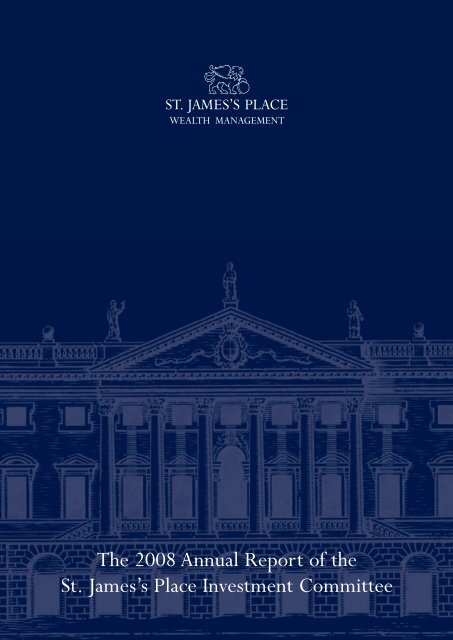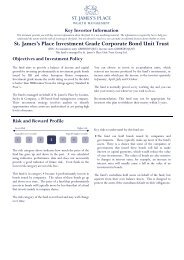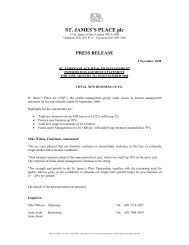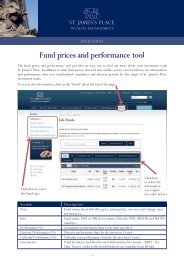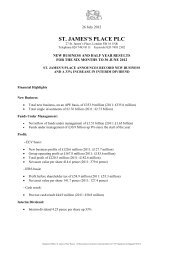Report of the Investment Committee 2008 - St James's Place
Report of the Investment Committee 2008 - St James's Place
Report of the Investment Committee 2008 - St James's Place
You also want an ePaper? Increase the reach of your titles
YUMPU automatically turns print PDFs into web optimized ePapers that Google loves.
The <strong>2008</strong> Annual <strong>Report</strong> <strong>of</strong> <strong>the</strong><strong>St</strong>. James’s <strong>Place</strong> <strong>Investment</strong> <strong>Committee</strong>
Chairman’s <strong>St</strong>atementRegular readers <strong>of</strong> this Annual <strong>Report</strong> will know that I have neverbelieved in <strong>the</strong> ability <strong>of</strong> anyone – including myself – to forecast shorttermmovements in stock prices.I ended last year’s report by saying that I had no idea what wouldhappen to markets during <strong>2008</strong>, whe<strong>the</strong>r <strong>the</strong>y would end higher orlower compared to <strong>the</strong> start <strong>of</strong> <strong>the</strong> year. Well we all know now that<strong>2008</strong> turned out to be <strong>the</strong> most difficult and challenging year, from bothan investment and an economic perspective, for a generation or more.And yet as late as <strong>the</strong> end <strong>of</strong> December 2007, <strong>the</strong> press carried marketforecasts for <strong>the</strong> coming year ranging from just under 6000 to near 8000. Not one <strong>of</strong> <strong>the</strong> ‘marketexperts’ were right, demonstrating that no one expected <strong>the</strong> markets to unfold in <strong>the</strong> way <strong>the</strong>yeventually did.Indeed for <strong>the</strong> first half <strong>of</strong> <strong>the</strong> year <strong>the</strong> market registered both negative and positive months in amanner not too dissimilar from previous years. However, all this changed in late September whenfinancial markets around <strong>the</strong> world fell sharply following <strong>the</strong> collapse <strong>of</strong> Lehman Bro<strong>the</strong>rs asinvestor confidence evaporated.For many <strong>of</strong> us it has been <strong>the</strong> sheer speed at which events have unfolded and <strong>the</strong>ir global impactthat has been most disconcerting and at times worrying. I think that if anyone had written afinancial thriller and included all <strong>of</strong> <strong>the</strong> events witnessed in <strong>the</strong> last few months, literary criticswould have been justifiably scornful. The collapse or rescue <strong>of</strong> many leading financial institutions,precipitated by <strong>the</strong> financial crisis, is unprecedented and has led to sharp falls across worldfinancial markets. Undoubtedly, <strong>the</strong>re will be lessons learnt from <strong>the</strong> experiences <strong>of</strong> <strong>2008</strong> and wewill draw on those as we continue to evolve our approach to investment management.So where does that leave us today? It is likely that almost everyone will have found <strong>the</strong>ir portfoliovaluations uncomfortable reading – <strong>the</strong>re is no denying that even high calibre investmentmanagers have found few, if any, hiding places from <strong>the</strong> financial maelstrom.In response to current events, investors have, quite rightly, been asking <strong>the</strong> question “What actionhas <strong>St</strong>. James’s <strong>Place</strong> taken to protect my wealth during <strong>the</strong> crisis?”Whilst it is obviously not possible in a report <strong>of</strong> this nature to address individual circumstances,I believe <strong>the</strong> question posed is a good starting point for this year’s report and have addressed it in twoparts: looking at it from a corporate position and secondly, from <strong>the</strong> fund managers’ perspective.From a corporate perspective, our success to date has depended to a considerable extent on twocentral aspects <strong>of</strong> our approach to wealth management. Firstly, <strong>the</strong> emphasis we place on buildingstrong, lasting personal relationships with our clients and secondly on our distinctive and effectiveapproach to investment management.3
The strength <strong>of</strong> Partners’ relationships with <strong>the</strong>ir clients has meant that both are taking a longtermview which in turn has led to our business having one <strong>of</strong> <strong>the</strong> highest retention <strong>of</strong> fundsunder management in <strong>the</strong> industry – currently 95%. The advantages <strong>of</strong> this are not alwaysimmediately apparent, but, as I was reminded <strong>the</strong> o<strong>the</strong>r day by one <strong>of</strong> our independent fundmanagers, it has meant that he (and <strong>the</strong> o<strong>the</strong>r managers) has not been forced to sell investmentsfrom his <strong>St</strong>. James’s <strong>Place</strong> funds to meet investors’ redemptions. This contrasts sharply with hiso<strong>the</strong>r retail funds where he has been forced to sell good quality investments at depressed pricesto raise liquidity to meet client withdrawals. He went on to say that in <strong>the</strong> longer term this wouldundoubtedly increase <strong>the</strong> chances <strong>of</strong> superior investment performance from <strong>the</strong> portfoliosmanaged for us because his longer-term investment strategy had not been disturbed.As well as helping to retain funds, our relationship led business has continued to attract newinvestment into our funds, despite <strong>the</strong> tough market conditions. Again, how does this benefitexisting clients? Well once more it helps our fund managers because <strong>the</strong>y continue to experiencenew flows <strong>of</strong> money into <strong>the</strong>ir funds which in turn, allows <strong>the</strong>m to implement short-term tacticalmoves to protect longer-term strategies. For example, <strong>the</strong>y can accrue <strong>the</strong>se new inflows andbuild up liquidity in <strong>the</strong> funds to help mitigate short-term volatility – which many <strong>of</strong> <strong>the</strong>managers have. It also means <strong>the</strong>y can, when <strong>the</strong>y feel <strong>the</strong> timing is right, use <strong>the</strong>se higher levels<strong>of</strong> cash to buy stocks in quality companies at lower prices and thus take a longer-term view for<strong>the</strong>ir investors. Again, <strong>the</strong>se are actions <strong>the</strong> managers have been engaged in recently. Thisapproach has been one <strong>of</strong> <strong>the</strong> factors enabling us to deliver consistent, superior investment resultsover <strong>the</strong> longer term.So, corporately, <strong>the</strong> benefits <strong>of</strong> our advice-based ethos go far beyond creating long-termrelationships with our clients.The second part <strong>of</strong> my answer sets out how <strong>the</strong> work <strong>of</strong> <strong>the</strong> <strong>Investment</strong> <strong>Committee</strong> has helpedcreate a safer – but not, I hasten to add, risk-free – environment for our investors’ wealth.Firstly we endeavour to avoid what we see as short-term investment fashions – those investmentopportunities that carry <strong>the</strong> hall marks <strong>of</strong> potentially large gains achieved in a short space <strong>of</strong> timewith little perceived risk but that ultimately go horribly wrong. The Technology Funds <strong>of</strong> <strong>the</strong> late1990’s come immediately to mind and <strong>the</strong>re have been many o<strong>the</strong>rs such as Split-Capital<strong>Investment</strong> Trusts and Precipice Bonds. All have cost investors (but not clients <strong>of</strong> <strong>St</strong>. James’s<strong>Place</strong>) dearly. More recently we have chosen not to follow o<strong>the</strong>r companies into launching fundsin <strong>the</strong> highly specialist areas <strong>of</strong> China, India and Russia. Their economies may be growing stronglybut <strong>the</strong>ir stock markets have fallen sharply by anything up to 70% this year on fears <strong>of</strong> economicfallout from <strong>the</strong> credit crisis. Our preferred approach is to concentrate on selecting high qualitymanagers and <strong>the</strong>n to allow <strong>the</strong> individual fund managers to make <strong>the</strong>ir own judgement aboutwhich area <strong>the</strong>y wish to invest in and crucially, <strong>the</strong> timing <strong>of</strong> <strong>the</strong>ir decision.4
But during this severe downturn we have seen no reason to replace any fund managers. All haveadhered to <strong>the</strong>ir stated investment style. <strong>St</strong>amford have advised us that <strong>the</strong>y continue to maintainconfidence in <strong>the</strong> managers with whom we currently work. It is <strong>the</strong> continuous and detailedmonitoring <strong>of</strong> <strong>the</strong>ir activities that is, we believe, a key element in enabling us to create a ‘safe’long-term investment environment for our investors.Whilst <strong>the</strong> <strong>Investment</strong> <strong>Committee</strong>, assisted by <strong>St</strong>amford Associates, can create <strong>the</strong> structure todrive our investment philosophy, it is <strong>the</strong> individual fund managers who make <strong>the</strong> day-to-daydecisions about which particular stocks <strong>the</strong>y wish to own and <strong>the</strong> timing <strong>of</strong> those investments.We create a positive environment for our managers by allowing <strong>the</strong>m maximum freedom toinvest within <strong>the</strong> terms <strong>of</strong> <strong>the</strong>ir mandate and we are also prepared to be patient for superiorresults. But ultimately, each manager must take responsibility for <strong>the</strong> performance <strong>of</strong> <strong>the</strong>irportfolios – in good and bad markets alike.As I think back on <strong>the</strong> numerous meetings I have had with our managers this year I have beenimpressed by <strong>the</strong> consistency shown by <strong>the</strong>m during <strong>the</strong>se turbulent times. Unlike many o<strong>the</strong>rswithin <strong>the</strong>ir peer group, decisions not to own banking stocks for example, have proven to be veryshrewd. Similarly some <strong>of</strong> <strong>the</strong> managers eschewed <strong>the</strong> commodity boom, dismissive <strong>of</strong> <strong>the</strong> claimthat we were in a new paradigm. Many managers took decisions to increase liquidity both beforeand during <strong>the</strong> crisis and are now able to use <strong>the</strong>se reserves to buy stocks <strong>the</strong>y like at verydepressed levels which will be a store <strong>of</strong> value for <strong>the</strong> future when <strong>the</strong> markets recover.Against this very testing backdrop, I have asked each <strong>of</strong> <strong>the</strong> managers <strong>of</strong> our global ManagedFunds to briefly explain what defensive action <strong>the</strong>y have taken to protect, to <strong>the</strong> extent it hasbeen possible, our investors’ wealth during <strong>the</strong>se turbulent times. Their views are set out in <strong>the</strong>next section <strong>of</strong> this report. As you read <strong>the</strong>ir comments I think you will be encouraged thathowever challenging <strong>the</strong> markets, <strong>the</strong>y have demonstrated high levels <strong>of</strong> conviction throughout.Throughout this report I have endeavoured to demonstrate that our approach to investmentmanagement is ‘all wea<strong>the</strong>r’ and by that I mean we have consciously striven to create a ‘safer’environment by reducing as many <strong>of</strong> <strong>the</strong> risks associated with investment as possible. Firstly byencouraging our investors to diversify <strong>the</strong>ir assets across <strong>the</strong> different classes according to <strong>the</strong>irrisk pr<strong>of</strong>ile and, secondly as I said earlier, by investment manager style. The monitoring <strong>of</strong> <strong>the</strong>managers by <strong>St</strong>amford Associates acts as <strong>the</strong> ‘early warning’ system, fur<strong>the</strong>r reducing <strong>the</strong> risks <strong>of</strong>long-term underperformance.So what guidance can we give our investors on timing <strong>the</strong>ir investments in our funds – is it agood or a bad moment to cash in some or all <strong>of</strong> <strong>the</strong>ir investments and should <strong>the</strong>y be making newinvestments? This comes back to <strong>the</strong> starting point <strong>of</strong> this introduction. Of course, if you knewwhen <strong>the</strong> market was at its high and when it was at its low, those questions would be easy toanswer, but <strong>the</strong> reality is that <strong>the</strong> world is so uncertain that no-one can make decisions on <strong>the</strong>basis <strong>of</strong> short term conditions.6
Can investors take comfort from history or, is it really different this time? In <strong>the</strong> next section <strong>of</strong><strong>the</strong> report, <strong>the</strong> economist Anatole Kaletsky, one <strong>of</strong> our most respected journalists, provides histhoughts on <strong>the</strong> market and <strong>the</strong> economic and historical context. I hope you find his views bothinteresting and helpful.Whilst we certainly cannot predict with any certainty that <strong>the</strong> market has reached its low point,it is not unreasonable to assume that at current depressed levels investors prepared to take amedium to long-term view are likely to be ultimately rewarded.Likewise, with global stock markets at such low levels, investors thinking about cashing-in <strong>the</strong>irinvestments will crystalise once and for all what may be as yet, paper losses. The economicclimate is changing and <strong>the</strong> era <strong>of</strong> cash generating real returns is over for now because recessionin <strong>the</strong> major Western economies during 2009 is certain according to policymakers, who inresponse are cutting <strong>the</strong> cost <strong>of</strong> borrowing. The US Federal Reserve recently announced virtuallyzero interest rates and here in <strong>the</strong> UK it is not unthinkable that a similar thing could happen.Whilst this may be good news for borrowers, for savers it is <strong>the</strong> opposite and we are at <strong>the</strong> pointwhere for many people <strong>the</strong> returns <strong>the</strong>y earn on <strong>the</strong>ir deposits, taking account <strong>of</strong> inflation andtaxation, are ei<strong>the</strong>r zero or negative. In contrast <strong>the</strong> yield, net <strong>of</strong> basic rate tax, on <strong>the</strong> UK stockmarket is at its highest point for over 20 years at around 4.5%, reflecting current low shareprices. Again experience tells us that this is a situation that won’t last forever and that ultimately<strong>the</strong> intrinsic value <strong>of</strong> equities will be recognised by long-term investors.Against this changing economic landscape it is hardly surprising investors are looking for guidanceon how best to position <strong>the</strong>ir wealth. Longstanding clients will know that our philosophy <strong>of</strong> ‘buyand hold’ has held good over many years and <strong>the</strong>re is no reason to doubt that once through <strong>the</strong>current downturn, markets will resume <strong>the</strong>ir long upward trend. Are we near <strong>the</strong> end? No-oneknows so, once again, I will stay with tradition and make no predictions for what <strong>the</strong> coming yearmay bring. I want, however, to reassure all <strong>of</strong> our investors that we are completely focused onputting <strong>the</strong>m in <strong>the</strong> strongest possible position to ride out <strong>the</strong> current storm. Regardless <strong>of</strong> <strong>the</strong>prevailing financial climate, <strong>the</strong> <strong>Investment</strong> <strong>Committee</strong> will continue to ensure <strong>the</strong> approach wehave to investment means a safer place for our clients’ wealth over <strong>the</strong> longer term.I wish you all <strong>the</strong> very best for 2009 and beyond.Sir Mark Weinberg7
Anatole Kaletsky“This time it’s different” are said to be <strong>the</strong> four most expensive words in<strong>the</strong> English language. In every speculative mania, investors believe <strong>the</strong>yhave found something “different” from previous boom-bust cycles – andevery time this turns out to be a delusion, <strong>the</strong> bulls lose <strong>the</strong>ir shirts, while<strong>the</strong> bears get <strong>the</strong> last laugh.But is this really true? Consider <strong>the</strong> bearish sceptic who pulled out <strong>of</strong>global stockmarkets when <strong>the</strong> phrase “irrational exuberance” was firstcoined. In December 1996, when Alan Greenspan used <strong>the</strong>se words todescribe what was widely seen as an unsustainable bull-market, <strong>the</strong> DowJones Industrial Average stood at 6400. Today, after <strong>the</strong> worst bear marketfor 70 years, it is 9000. And comparing <strong>the</strong> present bear market with previous financial panics, wefind that investors are up five-fold in terms <strong>of</strong> <strong>the</strong> Dow and three-fold in terms <strong>of</strong> <strong>the</strong> FTSE if <strong>the</strong>ybought shares in <strong>the</strong> 1987 global meltdown, when George Soros first declared that “this is 1929”.The point <strong>of</strong> <strong>the</strong>se comparisons is not just to state <strong>the</strong> obvious: that panics are a better time to buythan to sell. There is a subtler point. Just as <strong>the</strong> bulls believe that every market boom is “different”and heralds unprecedented economic prosperity, pessimists think that each bear market is uniqueand portends a recession that will never end. And indeed, <strong>the</strong>re usually is something different aboutevery slump. This time it’s <strong>the</strong> credit crunch and property crash; in 1992 it was 15% interest ratesand <strong>the</strong> collapse <strong>of</strong> sterling; in 1982 it was three million unemployed and 20% inflation; in 1987 itwas a one-day fall in stockmarkets which, according to statistical models, should not have occurredin a billion years. After each such unique disaster <strong>the</strong> prophets <strong>of</strong> doom declare that capitalism isdoomed, that markets will never recover, that this is a “once in a lifetime crisis” – but each timemarkets do recover, capitalism survives and investors who kept <strong>the</strong>ir nerve are amply rewarded.This is not to deny that several features <strong>of</strong> <strong>the</strong> present economic crisis really are exceptionally grave.The collapse <strong>of</strong> global finance triggered by <strong>the</strong> Lehman bankruptcy really was unprecedented; aswas <strong>the</strong> subsequent fall in industrial output; and <strong>the</strong> level <strong>of</strong> debts is high in many countries, thoughnot quite as daunting as generally believed. But against <strong>the</strong>se unprecedented deflationary pressuresare arrayed expansionary forces that are unprecedented too: <strong>the</strong> lowest interest rates in history; <strong>the</strong>steepest ever fall in oil prices; <strong>the</strong> biggest-ever peacetime public works programmes and tax cuts;and a willingness to print money without limit by <strong>the</strong> central banks. And behind <strong>the</strong>seunprecedented policies, two unprecedented long-term trends continue to push <strong>the</strong> world economyahead: <strong>the</strong> integration into <strong>the</strong> world capitalist system <strong>of</strong> 3 billion new producers and consumers inAsia and former communist countries; <strong>the</strong> truly global division <strong>of</strong> labour created by costlesscommunications, cheap transport and free trade.8
How should investors react to this tug-<strong>of</strong>-war between unprecedented deflationary andexpansionary forces? In <strong>the</strong> long-term, capitalism has survived far worse crises than this one: forexample, <strong>the</strong> galloping inflation <strong>of</strong> <strong>the</strong> 1970s. Contrary to conventional wisdom, inflation is muchharder to cure than deflation. Recall <strong>the</strong> political and financial pain <strong>of</strong> Margaret Thatcher’s 20%interest rates, doubling <strong>of</strong> VAT and mass public-sector lay<strong>of</strong>fs. In comparison, <strong>the</strong> zero interest rates,tax cuts and government subsidies demanded by today’s conditions make political leadership easy. In<strong>the</strong> year ahead <strong>the</strong>se anti-deflation policies will certainly be adopted on a global basis and economicrecovery will eventually follow.Less clear is how fast <strong>the</strong>se events will move. In <strong>the</strong> short term <strong>the</strong>re will surely be more bad newson pr<strong>of</strong>its and unemployment, but how much <strong>of</strong> this misery has already been discounted in marketprices will only be known with hindsight. Near-zero interest rates will boost economic activity andasset values at some point; but credit paralysis makes <strong>the</strong> timing <strong>of</strong> this process impossible to guess.What we do know for sure is that financial crises are a natural feature <strong>of</strong> <strong>the</strong> capitalist system. Wealso know that after every crisis, financial markets and <strong>the</strong> real economy eventually recover. Inresponse to apocalyptic claims that this crisis is different from every o<strong>the</strong>r and that this time <strong>the</strong> skyreally will fall in, investors should consider <strong>the</strong> words <strong>of</strong> Yogi Berra, <strong>the</strong> US baseball coach whoreflected on some equally unprecedented disaster on <strong>the</strong> sports field: “At times like this, it pays toremember that <strong>the</strong>re’ve always been times like this.”9
<strong>St</strong>amford Associates <strong>2008</strong><strong>Report</strong> to <strong>the</strong> <strong>Investment</strong> <strong>Committee</strong>Dear Sirs,We are pleased to provide our report for <strong>2008</strong>, reviewinginvestment manager–related activity across SJP’s funds over <strong>the</strong>year. Your investors do not need us to state <strong>the</strong> obvious, namely that<strong>2008</strong> was unprecedented, for <strong>the</strong> reasons already covered at greatlength by <strong>the</strong> wider press. The substantial share price declinesacross global equity markets, as well as <strong>the</strong> price collapse <strong>of</strong> o<strong>the</strong>rfinancial assets, represent an extremely painful experience forinvestors. However, it is important to differentiate between <strong>the</strong>consequences arising from realising an investment at a loss and amark to market price adjustment that may only turn out to betemporary.At <strong>the</strong> time <strong>of</strong> writing, global equity markets declined some 30% to40% over <strong>the</strong> year in local currency terms. Ultimately, investorsare rightly concerned about capital preservation in <strong>the</strong> long runand, <strong>the</strong>refore, it may be <strong>of</strong> little comfort that a number <strong>of</strong> yourinvestment managers achieved favourable returns relative to <strong>the</strong>market, albeit still recording significant declines in capital values inan absolute sense.Conversely, stock market volatility, i.e. intra-day share pricefluctuations, has been at unprecedented high levels, demonstrating <strong>the</strong>fickle nature <strong>of</strong> <strong>the</strong> market in response to a wide range <strong>of</strong> externalinfluences – <strong>the</strong> credit crunch, housing market concerns, commodityprice fluctuations, government interventions, <strong>the</strong> temporary ban onshort-selling, de-leveraging, bail outs and bankruptcies.As noted in our half year report to June <strong>2008</strong>, our views <strong>of</strong> yourinvestment managers are not influenced by short term investmentresults. This is particularly relevant in <strong>the</strong> current marketenvironment where snap-shot investment results can be significantlyand randomly impacted, for good or bad, by volatile share pricemovement at <strong>the</strong> end <strong>of</strong> <strong>the</strong> reporting period. These results simplydo not reflect <strong>the</strong> managers’ longer term investment <strong>the</strong>ses nor do<strong>the</strong>y reflect <strong>the</strong> fundamentals <strong>of</strong> many <strong>of</strong> <strong>the</strong> underlying businessesin which <strong>the</strong> managers are invested.10
STAMFORD ASSOCIATES <strong>2008</strong> REPORT TO THE INVESTMENT COMMITTEEWe formulate our views on our understanding <strong>of</strong> <strong>the</strong> manager’sinvestment processes and <strong>the</strong> content as well as <strong>the</strong> transactions wewitness in <strong>the</strong> portfolios. Your investment managers usually take uplong term investment positions and ultimately <strong>the</strong> success <strong>of</strong> <strong>the</strong>irjudgements is a function <strong>of</strong> two key decisions – when <strong>the</strong>y make aninvestment and when <strong>the</strong>y sell it. In practice <strong>the</strong>re is rarely, if ever,in terms <strong>of</strong> share price movements a straight line between <strong>the</strong> twoand, in recent months <strong>of</strong> course, it has only gone one way.However, <strong>the</strong> fact that many <strong>of</strong> your investment managers arenursing significant unrealised losses does not, in itself, make <strong>the</strong>investments inappropriate or wrong. In our view, it is more likely tomean that <strong>the</strong>ir investment <strong>the</strong>ses has been delayed and may haveyet to play out.Your investment managers typically construct <strong>the</strong>ir portfolios from<strong>the</strong> bottom up by focusing on individual companies. They tend to bevaluation sensitive with an absolute return orientation to <strong>the</strong> stockselection process. They are not market timers and/or momentuminvestors. They typically allocate capital to quality companies which<strong>the</strong>y believe are attractively valued, <strong>of</strong>ten have misunderstoodprospects and are <strong>the</strong>refore <strong>of</strong>fering attractive risk/rewardcharacteristics in <strong>the</strong> medium to long term. Our assessment <strong>of</strong> <strong>the</strong>underlying portfolios, toge<strong>the</strong>r with frequent dialogues with <strong>the</strong>managers, confirms that <strong>the</strong>y are applying <strong>the</strong>ir investment disciplineson a consistent basis.At this juncture we derive considerable comfort from <strong>the</strong> fact that<strong>the</strong> great majority <strong>of</strong> <strong>the</strong>ir portfolio holdings appear relatively cheapon <strong>the</strong> basis <strong>of</strong> fundamental measures such as price to earnings,price to book, price to cash flow, etc. Fur<strong>the</strong>rmore, <strong>the</strong> managers’recent portfolio turnover has been relatively low, reflecting <strong>the</strong>irbelief that <strong>the</strong>re is substantial inherent value to be unlocked in duecourse when more normal market conditions return. In addition,we understand from <strong>the</strong> managers that <strong>the</strong>re will be many newinvestment opportunities arising from <strong>the</strong> current marketdislocations and we are optimistic that <strong>the</strong>y are appropriatelypositioned to take advantage <strong>of</strong> those.11
STAMFORD ASSOCIATES <strong>2008</strong> REPORT TO THE INVESTMENT COMMITTEEIn such turbulent times we consider it critical to keep a cool headand to avoid ill considered reactions. We do not generally quoteinvestment gurus and we are also not fans <strong>of</strong> sound bites. However,we consider that whoever first said “buy low, sell high” was <strong>of</strong>feringsome very sound advice. This fundamental investment principle ispertinent at three levels:1. At <strong>the</strong> portfolio level all indications are that your investmentmanagers are prepared to stay with portfolios that <strong>the</strong>y considerto be lowly valued with substantial upside potential;2. At <strong>the</strong> manager level we consider it appropriate to retaininvestment managers who happen to be experiencing short termcyclical underperformance if we believe that <strong>the</strong>y are likely toadd significant long term value;3. At <strong>the</strong> fund level we are advising our clients to avoid knee jerkreactions away from depressed equities and corporate bonds infavour <strong>of</strong> cash and gilts as this will lock in significant capitallosses. Clearly this is inevitable if an individual has a need torealise capital in <strong>the</strong> short term.Our ongoing manager monitoring role remains critical to retainingconfidence in your investment managers, in particular within <strong>the</strong>current economic and equity market environment. Declining marketshave a direct impact upon investment managers’ pr<strong>of</strong>itability and,ultimately <strong>the</strong>ir viability in business terms. Therefore is also importantfor us to focus upon non-investment issues such as <strong>the</strong>ir business plans,resources and morale.In such turbulent times we are pleased to report that <strong>the</strong> <strong>St</strong>. James’s<strong>Place</strong> investment manager platform has been extremely stable over<strong>the</strong> year. Oldfield Partners and Thornburg <strong>Investment</strong> Managementwere appointed as co-managers <strong>of</strong> <strong>the</strong> <strong>St</strong>. James’s <strong>Place</strong> High OctaneFund in April, and we have <strong>the</strong> utmost regard for <strong>the</strong> key investmentpr<strong>of</strong>essionals, namely Richard Oldfield and Vin Walden. At <strong>the</strong> sametime, Invesco Perpetual was appointed to <strong>the</strong> <strong>St</strong>. James’s <strong>Place</strong>Corporate Bond Fund, and we view Paul Causer and Paul Read, <strong>the</strong>two Henley-based portfolio managers, as being in <strong>the</strong> same mould as12
STAMFORD ASSOCIATES <strong>2008</strong> REPORT TO THE INVESTMENT COMMITTEENeil Woodford, albeit, <strong>of</strong> course, in respect <strong>of</strong> bonds ra<strong>the</strong>r thanUK equities. Barclays Global Investors were appointed to <strong>the</strong> new<strong>St</strong>. James’s <strong>Place</strong> Alternative Assets Fund in August and <strong>the</strong> expertisethat this manager brings to this investment proposition is arguablysecond to none.In conclusion, <strong>the</strong>re appears to have been a negative correlationover <strong>the</strong> year between stock market volatility and investmentmanager activity. We derive considerable comfort from this becauseit is consistent with our belief that your investment managers and<strong>the</strong>ir portfolios are well placed to deliver favourable investmentresults going forward, both in an absolute and relative sense.We hope that this report provides reassurance regarding <strong>the</strong> robustness<strong>of</strong> <strong>the</strong> <strong>St</strong>. James’s <strong>Place</strong> investment management platform and we verymuch look forward to serving investors and <strong>the</strong> Partnership to ourbest ability in 2009.<strong>St</strong>amford Associates LimitedDecember <strong>2008</strong>13
<strong>Report</strong> on <strong>the</strong> <strong>St</strong>. James’s <strong>Place</strong>Property Portfolios <strong>2008</strong>In common with most o<strong>the</strong>r types <strong>of</strong> investment, <strong>2008</strong> was a poor year for UK CommercialProperty. Few in <strong>the</strong> market expected that <strong>the</strong> fall in capital values starting in 2007 wouldaccelerate in <strong>2008</strong>; most property investors thought <strong>the</strong> first half <strong>of</strong> <strong>the</strong> year would be difficult, withrecovery perhaps starting in <strong>the</strong> third or fourth quarter. How wrong that turned out to be. Thefallout from <strong>the</strong> credit crunch proved much greater than expected. The unavailability <strong>of</strong> credit,combined with falling residential values and <strong>the</strong> onset <strong>of</strong> a recession in <strong>the</strong> UK economy combinedto decimate <strong>the</strong> commercial property sector. These, toge<strong>the</strong>r with valuation difficulties as dealsbecame few and far between and declining rents, led to a fall in capital value <strong>of</strong> 31.5% from <strong>the</strong>peak in August 2007. In November <strong>2008</strong>, IPD recorded <strong>the</strong> largest ever fall in one month <strong>of</strong>5.1% since <strong>the</strong> launch <strong>of</strong> <strong>the</strong> Monthly Index in 1987.Initial yields are now approaching 8% compared with 4.6% in 2007 and 9.1% in <strong>the</strong> early 1990’s.<strong>2008</strong> investment volumes are down to about 55% <strong>of</strong> <strong>the</strong> 2007 total at £21bn. Development is at astandstill and occupier demand continues to fall. Surprisingly few property companies failed during<strong>the</strong> year but those that are heavily borrowed will struggle in 2009.In <strong>the</strong> midst <strong>of</strong> this turmoil one might have expected that <strong>the</strong> quality <strong>of</strong> <strong>the</strong> <strong>St</strong>. James’s <strong>Place</strong>portfolio would have helped it to perform a bit better than <strong>the</strong> market generally. As it transpires, thishas not been <strong>the</strong> case, despite <strong>the</strong> inherent quality <strong>of</strong> <strong>the</strong> portfolio, longer lease lengths and lowervoids than average. Overall, <strong>the</strong> portfolio has fallen broadly in line with falls in market values.Despite <strong>the</strong> present gloom, <strong>the</strong>re are some glimmers <strong>of</strong> light. Commercial property, as an assetclass, has been proven to be a sound investment in <strong>the</strong> longer term and, as <strong>the</strong> UK economyemerges from recession, returns will pick up. In addition to <strong>the</strong> longer than average lease lengthand low voids, <strong>the</strong> SJP portfolio has above average rental growth prospects due to <strong>the</strong> policy <strong>of</strong>buying prime stock in <strong>the</strong> period 2005 to 2007 which should benefit returns as <strong>the</strong> sector recovers.There are signs that private investors have returned to <strong>the</strong> auction room as a source <strong>of</strong> directproperty in response to <strong>the</strong> fall in prices. One consequence <strong>of</strong> <strong>the</strong> sharp fall in <strong>the</strong> value <strong>of</strong><strong>St</strong>erling is that UK assets are now more affordable for overseas buyers. In <strong>the</strong> short term, valuersare unable to accurately price property until <strong>the</strong> volume <strong>of</strong> deals picks up. It is also likely that, as<strong>the</strong> UK recession bites, more businesses will fail, increasing <strong>the</strong> number <strong>of</strong> voids and exercisingfur<strong>the</strong>r downward pressure on rents. However, notwithstanding <strong>the</strong> short term pressure onvalues, at current prices commercial property is becoming attractive and, whilst transactionvolumes are likely to remain low until credit and investor confidence returns, property is likely toreward patient investors over <strong>the</strong> medium to longer term.K.M. Goulborn FRICSDecember <strong>2008</strong>14
<strong>Investment</strong> ManagerCommentariesThe following updates provide <strong>the</strong> views <strong>of</strong> <strong>the</strong> managers <strong>of</strong> our global and balanced Managedfunds, explaining <strong>the</strong> action <strong>the</strong>y have been taking in <strong>2008</strong> to protect as far as possible, andposition <strong>the</strong> investment <strong>the</strong>y manage for our clients whilst recognising <strong>the</strong> dramatic falls seen inall asset classes has meant that absolute returns have been disappointing.Richard PeirsonSJP/AXA Framlington Managed FundIn recent months, as <strong>the</strong> credit crisis widened and deepened and economicgrowth slowed everywhere, we have adopted a cautious stance towardsindividual investments. We now hold more cash and bonds than we have heldhistorically, to reflect <strong>the</strong> uncertain outlook, and within bonds we only owngovernment bonds, UK Gilts and German Bunds. The UK Gilts have aslightly shorter duration but <strong>the</strong> German Bunds are long dated, reflectinggreater confidence in that country's finances compared to <strong>the</strong> UK.The UK economy looks to be one <strong>of</strong> <strong>the</strong> weakest <strong>of</strong> <strong>the</strong> major developed economies and wehave reduced our weight <strong>the</strong>re. In addition, within <strong>the</strong> UK our focus has been on companieswith overseas ra<strong>the</strong>r than domestic earnings. New investments have been in companies thatshould have defensive characteristics, but in nervous markets, and with an increasingly poorearnings outlook, finding such companies has not been easy. Pharmaceuticals is one largedefensive sector we have added to and are now very overweight. We have avoided newinvestment in small companies which have higher specific risk and are very difficult to buy andsell in <strong>the</strong> current market circumstances. Our focus within <strong>the</strong> existing portfolio is on ensuringthat <strong>the</strong> companies we own have sufficient capital to trade through this difficult economic andfinancial background.15
Andrew GreenSJP/GAM ManagedWe have continued to witness high levels <strong>of</strong> volatility in worldwide financialmarkets but with <strong>the</strong> authorities continuing to take proactive steps to addressboth <strong>the</strong> current financial crisis and <strong>the</strong> developing recession, markets may havebegun to show some tentative initial signs <strong>of</strong> wanting to establish a pause in <strong>the</strong>collapse <strong>of</strong> values seen in <strong>2008</strong>. Throughout <strong>the</strong> year we have maintainedliquidity at around 17-20%. In addition, one quarter <strong>of</strong> <strong>the</strong> fund was invested in<strong>the</strong> Japanese market with a corresponding exposure to <strong>the</strong> Yen, which we havegradually hedged back into as <strong>St</strong>erling has weakened, which has helped recent performance.In addition, in <strong>the</strong> previous two years, we specifically reduced small company content <strong>of</strong> <strong>the</strong>portfolio and built up holdings like Deutsche Telekom in Germany and Bristol Myers in <strong>the</strong> US.This action toge<strong>the</strong>r with our positioning in pharmaceuticals has also provided support. Acombination <strong>of</strong> <strong>the</strong>se three factors has helped us avoid <strong>the</strong> very worst <strong>of</strong> <strong>the</strong> sell-<strong>of</strong>f to date butnone<strong>the</strong>less <strong>the</strong> portfolio has been impacted by <strong>the</strong> routing <strong>of</strong> those stocks that are perceived tohave a recovery bias, but in <strong>the</strong> subdued environment we are entering, those situations <strong>of</strong>fering ameasure <strong>of</strong> growth and stability will become increasingly valued.16
Neil WoodfordSJP/Invesco Perpetual Managed Fund<strong>2008</strong> has been difficult for <strong>the</strong> UK economy, <strong>the</strong> stockmarket and for our fund.Although <strong>the</strong> fund fared relatively better than <strong>the</strong> FTSE All-Share index in thistime period, it is always disappointing to report negative returns to our investors.At <strong>the</strong> start <strong>of</strong> this year, we felt that <strong>the</strong> fund’s bias toward defensive sectors wasappropriate for <strong>the</strong> deteriorating economic conditions which we were expectingover <strong>the</strong> next 18 months. Defensive sectors, such as electricity andpharmaceuticals, featured prominently in <strong>the</strong> fund as we felt that <strong>the</strong>ir defensive business models –low volatility <strong>of</strong> returns and ability to grow earnings, cashflows and dividends – placed <strong>the</strong>m in agood position to navigate <strong>the</strong>ir way through <strong>the</strong> difficult times. Holdings such as electricity companyBritish Energy and pharmaceuticals company AstraZeneca performed well for <strong>the</strong> fund and helped toprotect clients’ assets in <strong>2008</strong>, as did our decision to avoid banks and consumer-facing sectors, wherewe felt <strong>the</strong>re was fur<strong>the</strong>r downside in individual stocks within those sectors <strong>of</strong> <strong>the</strong> market.17
Alex <strong>St</strong>anicSJP/Newton Managed FundThe Portfolio has altered some <strong>of</strong> its positioning over <strong>the</strong> year to reflect <strong>the</strong>deteriorating economic environment. The biggest sector change over <strong>the</strong> yearhas occurred in healthcare, which has moved from a large underweight to arelative overweight. The sector’s defensive characteristics <strong>of</strong> strong balancesheets, low debt and good cash flow generation should be rewarded in <strong>the</strong>current investment environment.From a regional perspective, we have reduced exposure to emerging markets such as South Africa,Russia and Brazil and repatriated <strong>the</strong> returns to <strong>the</strong> US and Japan. This will have reduced some <strong>of</strong> <strong>the</strong>relative risk in <strong>the</strong> portfolio. Also exposure to <strong>the</strong> cyclical basic materials sector has been reduceddramatically over <strong>the</strong> year. The Portfolio maintained its exposure to <strong>the</strong> telecommunications sector in<strong>the</strong> anticipation that this would prove defensive. Unfortunately, <strong>the</strong> sector was not as defensive as weanticipated although we remain positive on <strong>the</strong> companies that we hold. The Portfolio has remainedunderweight in western banks over <strong>the</strong> year and we prefer to hold stocks in companies withrelatively low debt and strong cash flows whose valuations we believe are attractive on a medium tolong-term view.18
Nick PurvesSJP/Schroder Managed FundWhilst it is always disappointing to have to report falling unit prices, <strong>the</strong>UK equity portfolios that Schroders manages for <strong>St</strong>. James’s <strong>Place</strong> have beenoutperforming in this environment. We look to purchase shares in businessesthat are trading at a significant discount to <strong>the</strong>ir intrinsic value, which weestimate by calculating what we believe to be <strong>the</strong> ‘normalised’ earnings <strong>of</strong> abusiness. There are, <strong>of</strong> course, times when our calculations <strong>of</strong> intrinsic valuemay prove to be wrong. The fact that this risk exists is exactly why we will onlypurchase a security if it trades at a significant discount to conservative estimates <strong>of</strong> intrinsic value.We believe this approach <strong>of</strong>fers investors some defence against permanent capital loss and is whathas kept us away from <strong>the</strong> mining sector and, until recently, <strong>the</strong> banks. This has resulted in <strong>the</strong>portfolios falling less than <strong>the</strong> wider market.Fur<strong>the</strong>rmore, we are prepared to be patient for value to be realised. For instance, we boughtsignificant positions in <strong>the</strong> out-<strong>of</strong>-favour pharmaceutical names around 18 months ago. This movehas been favourable in recent months as pharmaceuticals have rallied on <strong>the</strong> basis <strong>of</strong> <strong>the</strong>ir lowvaluations and relatively defensive pr<strong>of</strong>it streams.19
John HodsonSJP/THSP Managed FundWe entered <strong>the</strong> period <strong>of</strong> <strong>the</strong> credit crunch with a defensive posture, havingsold a number <strong>of</strong> large holdings during <strong>the</strong> first half <strong>of</strong> 2007 as <strong>the</strong> growth <strong>of</strong>enthusiasm for risky assets in general, and <strong>the</strong> emergence <strong>of</strong> private equitybids for many large corporates in particular, led to a reduction inopportunities in <strong>the</strong> market for long term investors. Some <strong>of</strong> our biggerholdings – such as Alliance Boots and BAA – were bid for by leveragedoperators, and o<strong>the</strong>rs – such as Verizon, TeliaSonera and CVS – became tooexpensive to continue to hold. As a consequence our cash weighting rose.We also reduced our direct exposure to emerging markets. We have been a long term enthusiastfor <strong>the</strong> superior growth prospects <strong>of</strong> <strong>the</strong> emerging economies, but became concerned about <strong>the</strong>mania which gripped some parts <strong>of</strong> <strong>the</strong> investing public, and sold our China related stocks at highprices in <strong>the</strong> autumn <strong>of</strong> last year.THS has always believed in <strong>the</strong> principles <strong>of</strong> investing in companies with strong balance sheets.While growth in earnings is a crucial component <strong>of</strong> our excitement about equities, it is just asimportant to make sure that <strong>the</strong> companies we invest in have <strong>the</strong> strength to survive in difficultenvironments. Dividends are also vital, providing around two-thirds <strong>of</strong> <strong>the</strong> total return oncommon shares over long periods <strong>of</strong> time. Two characteristics <strong>of</strong> many <strong>of</strong> our holdings are<strong>the</strong>refore strong balance sheets and reasonable dividend yields, which have clearly helped <strong>the</strong>performance <strong>of</strong> <strong>the</strong> funds over <strong>the</strong> period. It is vital not to pay too much for shares as value canbe destroyed by paying too high a multiple <strong>of</strong> earnings, whe<strong>the</strong>r in terms <strong>of</strong> paying too much forgrowth, or paying a high multiple <strong>of</strong> earnings temporarily flattered by <strong>the</strong> economic cycle. Adiversified portfolio <strong>of</strong> modestly valued shares reduces this risk.Currency risk is one <strong>of</strong> <strong>the</strong> greatest faced by investors, as has been clearly highlighted to UKbased savers during this year while <strong>St</strong>erling has declined sharply in value against most <strong>of</strong> ourmajor trading partners. Running a reasonable overweight position in <strong>the</strong> Euro zone has helpedparticularly, as well as holding some <strong>of</strong> our liquidity position in US Dollars. We have significantlysold down our Japanese equity holdings over <strong>the</strong> past two months as <strong>the</strong> resurgent Yen hasappreciated sharply against both <strong>St</strong>erling and <strong>the</strong> Dollar.As we approach <strong>the</strong> end <strong>of</strong> <strong>the</strong> year, with most <strong>of</strong> <strong>the</strong> world’s developed stock markets down by40% or more on <strong>the</strong> year, equities are now discounting a very poor future economic climate, andwe have begun to slowly invest some <strong>of</strong> <strong>the</strong> funds’ liquidity.20
Bernie HornSJP/Worldwide Managed FundDuring <strong>2008</strong> I constructed <strong>the</strong> portfolio to include certain defensive positionsincluding utilities, consumer staples, telecommunications and niche-marketfirms. This strategy was implemented to <strong>of</strong>fset more cyclical investments incredit, construction, and materials. Defensive investments were valued basedon <strong>the</strong> stability <strong>of</strong> <strong>the</strong>ir cash flows. In general, <strong>the</strong> defensive holdings protectedvalue; specifically Japanese holdings helped moderate risk and benefited from astrong Yen.In <strong>the</strong> first quarter <strong>of</strong> <strong>2008</strong>, <strong>the</strong> fund’s sell discipline generated sales <strong>of</strong> investments at l<strong>of</strong>tyvaluations that proved well timed. As <strong>the</strong> difficult year progressed, portfolio companies werescrutinized to determine vulnerabilities to potential cash flow declines or re-financing difficulties.As a result <strong>of</strong> <strong>the</strong>se efforts, <strong>the</strong> fund reduced exposure to investments in materials, consumerdiscretionary, financials, and industrials – <strong>the</strong>se portfolio changes preserved capital. Despite suchefforts, <strong>the</strong> market crash that rolled from sector to sector had a negative impact on fund resultsbut I believe strongly that valuation declines have overshot <strong>the</strong> fundamental values <strong>of</strong> <strong>the</strong>companies held within this portfolio, this, in fact, creates strong buying opportunities.With risks present in <strong>the</strong> current environment, I will hold those investments that show <strong>the</strong>potential for dramatic increases when markets return to normal levels. Notwithstanding this view,<strong>the</strong> fund will remain nimble enough to make changes to avoid fur<strong>the</strong>r capital declines and to takeadvantage <strong>of</strong> undervalued opportunities in <strong>the</strong> evolving global landscape.21
Ian McVeighSJP/Cautious Managed FundJupiter fund managers have taken a variety <strong>of</strong> steps to mitigate <strong>the</strong> effects <strong>of</strong> <strong>the</strong>financial and economic crisis over <strong>the</strong> last year. We held a strong bias towardstriple-A rated bonds within <strong>the</strong> bond portfolio before <strong>the</strong> credit crisis began inmid 2007. This boosted performance as investors, worried by <strong>the</strong> sudden lack<strong>of</strong> liquidity, sought out higher quality assets. As <strong>the</strong> crisis unfolded, however, welooked for opportunities in lower-rated debt where spreads had reachedhistorically attractive levels.With regard to <strong>the</strong> fund’s UK equity holdings, we continued our very underweight position inUK bank stocks which we have held since mid-2007. This has been a significantly positivecontributor to <strong>the</strong> performance <strong>of</strong> <strong>the</strong> UK portfolio amid <strong>the</strong> credit crunch and <strong>the</strong> bail-out <strong>of</strong> highstreet banking names. In <strong>the</strong> European portfolio, Alex Darwall’s style has ensured a concentrationon companies with global operations, strong balance sheets and better prospects for growth than<strong>the</strong>ir peers. Elena Shaftan sharply reduced exposure to Russian equities, from almost 70% in May to30% and cut exposure to cyclical stocks such as oils and materials as commodity prices began t<strong>of</strong>all. The rebalanced portfolio now holds more defensive sectors e.g. pharmaceuticals and telecomsand has increased <strong>the</strong> cash level to above 20%.The portfolio’s overall structure, with its significant exposure to short dated bonds, has also helpedto mitigate <strong>the</strong> worst impact <strong>of</strong> weak global stock markets so far in <strong>2008</strong>.22
Members <strong>of</strong> <strong>the</strong> <strong>St</strong>. <strong>James's</strong> <strong>Place</strong> Wealth Management Group are authorised and regulated by <strong>the</strong> Financial Services Authority.The <strong>St</strong>. <strong>James's</strong> <strong>Place</strong> Partnership and <strong>the</strong> title `Partner' are <strong>the</strong> marketing terms used to describe <strong>St</strong>. <strong>James's</strong> <strong>Place</strong> representatives.<strong>St</strong>. <strong>James's</strong> <strong>Place</strong> UK plc: Registered Office <strong>St</strong>. <strong>James's</strong> <strong>Place</strong> House, Dollar <strong>St</strong>reet, Cirencester, Gloucestershire, GL7 2AQ, United KingdomRegistered in England Number 2628062www.sjp.co.ukSJP975-VR6(01/09)


